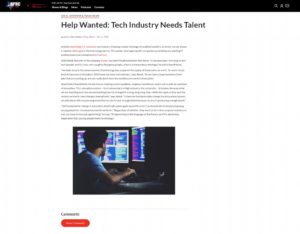
DALLAS (AP) – Abid Abedi wants to help fill the technology talent pipeline by starting with first-graders.
As a former CEO of a major technology staffing and consulting firm, Abedi knows the challenges and opportunities facing this country in keeping its IT sector energized with young, innovative minds.
“ICode is not just about teaching kids computer programming and robotics,” the company’s 51-year-old owner and CEO told The Dallas Morning News (http://bit.ly/1M64N7N). “It’s a holistic view of child development.”
ICode is structured like judo and karate, with a progression of seven colored belts. But in this case, students earn colored lanyards. They attend two one-hour classes and spend two hours in the lab each week, working their way through four-week learning segments. It takes about eight months to achieve the next “belt.”
The cost advances as well. Beginners in white – typically elementary school kids – pay $250 per month. Those going for the black pay $295 monthly.
Abedi, who owns 90 percent of the company, co-founded iCode Inc. with Rashmi Varma and Shadman Zafar, who hold the remaining shares.
He expects the first 12 months to bring in about $350,000 in revenue, not enough to be profitable but good enough for expansion plans. Abedi hopes to open more iCodes in North Texas next year and to begin franchising the concept. He says he gets several requests each week from around the country and abroad.
If Abedi were to enroll in iCode, his lanyard would be white.
“Even though I’ve been working with technology companies for 20 years, I’ve never really learned about computers,” he says. “My strategy is to surround myself with people who are smarter than me, let them do it and get out of the way.”
Abedi came to the United States in 1983 as a 17-year-old student at the University of Missouri, where he earned both his undergraduate and master’s degrees in accounting. He’s pretty sure he was the first foreign citizen to get into the Federal Reserve’s management training program.
“They had no idea what an H-1(B visa) was,” he says.
After a stint as national tax director for Payless ShoeSource, Abedi moved to Dallas in 1995 and launched Adea Solutions, an IT staffing company, the next year. At its height, Adea was an international IT consulting powerhouse with $135 million in annual revenue – before it and Abedi were dealt a near lethal blow by the bust of 2008.
Abedi sold the company in 2010 to Valtech Inc., barely making it out with his shirt and the vestiges of Adea’s tech-staffing company.
“It wasn’t the exit I’d envisioned, but I had no choice,” Abedi says. “I took up a small 1,700-square-foot office, which is how I started Adea. I started thinking, ‘What do I do next?’
“You can lose everything, but if you have the experience and the capability, you can build it back. I always tell people, ‘I’m a product of all my experiences.’ Nobody can take that away from you.”
The big lesson from his big bust was that he needs to be more diversified.
ICode shares a building with another of his ventures, Rosewood Academy, a preschool that also has locations in Dallas and Carrollton.
Abedi recently announced plans for 182 single-family townhouses on a 19-acre tract at the northwest corner of Plano and Independence parkways in Plano.
Jerry White, director of the Caruth Institute for Entrepreneurship at Southern Methodist University, has mentored Abedi for 12 years.
“Abid is the personification of focus and persistence,” White says. “Adversity and setbacks do not discourage or deter him. He is a quick learner and can pivot very quickly when required. He has an ability to adapt to whatever the circumstances he finds himself in – and never quits.”
Abedi wants to make sure that his students are prepared for college as well as for the careers that follow. So he created a paid advisory board that’s so powerful it could blow a circuit board.
It includes Hasan Pirkul, dean of the school of management at the University of Texas at Dallas; Suku Nair, chair of the computer science and engineering department at SMU; Farooq Khan, president of Samsung Research America-Dallas; and Jennifer Ceran, chief financial officer for Coupons.com in California.
Abedi says his advisers agree to speak to the school once a year, offer an internship to students who’ve graduated from iCode, and give the school a real project for advanced students to work on as a group.
“If they have a meaningful project from Ericsson, Nokia or Fujitsu, the kids are a lot more keen on it,” Abedi says.
Gowton Achaibar, chief information officer of Ericsson, was introduced to Abedi through a mutual friend.
“(Abedi) is filling that gap that’s existing today in our education system,” says Achaibar. “Technology has moved along. Companies have moved along. The whole world is moving along rapidly. But public schools are lagging behind. And there’s a reason why: It’s a huge investment for them to upgrade their systems to bring students along into the next century.”
Achaibar agreed to join the board after touring the facility. “I thought, ‘If this guy’s going to put in this kind of investment, why wouldn’t I want to give him a few hours of my time to see if I can contribute to what he’s trying to do?’”
Abedi has spent more than $1 million on the facility, staffing and curriculum planning.
“We’re not using any textbooks,” he says. “There is a significant investment in developing proprietary materials.”
Once a month, an advisory board member speaks and the students get to showcase what they’ve learned to parents. It’s the only time parents are allowed in the tech sanctum.
Last month, the speaker was Doug Moore, who told them what it was like to be chief operating officer at Fujitsu Network Communications. Forty elementary students participated in a minihack in which they developed an app.
Abedi isn’t following a blueprint – and he wouldn’t if one existed. “For an entrepreneur, it’s not fun to replicate. You want to do it from scratch,” he says. “The closest thing a man can come to giving birth to a human being is giving birth to a company. It’s painful but tremendously satisfying.”
___
Information from: The Dallas Morning News, http://www.dallasnews.com


